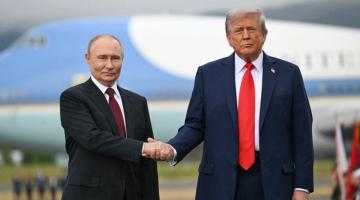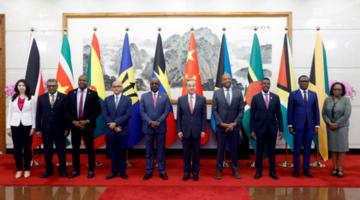The U.S. is putting into place the final pieces to spark another proxy war, this time in Taiwan.
Originally published in Popular Resistance.
Painting The Eyes Of War On The Buddha.
In many traditions, when you paint or sculpt a Buddha, the eyes are the very last to be painted. It’s only after the eyes have been completed that the sculpture is fully alive and empowered.
The US has just approved a $75 million weapons package to Taiwan province involving the sale of the Link 16 communications system.
The acquisition of Link 16 is analogous to “painting the eyes on the Buddha”: a last touch, it makes Taiwan’s military systems and weapons platforms live and far-seeing. It confers deadly powers, or more prosaically, in the words of the US military, it completes Taiwan as the final, lethal link of the multilateral coalition kill chain against China.
What exactly is Link 16? Link 16 is a key system in the US military communications arsenal. Specifically, it is the jam-resistant tactical data network for coordinating NATO weapons systems for joint operations in war.
If this sale is completed, it signals serious, granular, and single-minded commitment to kinetic war: it would signal that the Biden administration is as serious and unwavering in its desire to provoke and wage large-scale war with China over Taiwan, as it was with Russia over Ukraine, which also saw the implementation of this system. More important than any single weapons platform, this system allows the Taiwan/ROC military to integrate and coordinate all its warfighting platforms with US, NATO, Japanese, Korean, Australian militaries in combined arms warfare.
The deadliest link
It would thus be the deadliest piece of technology yet to be transferred because it allows sea, air, and land forces to be coordinated with others for lethal effect. It allows, for example, strategic nuclear/stealth bombers (US B-1B Lancers, B-2 Spirits) to coordinate with electronic warfare and surveillance platforms (EA Growlers, Prowlers, EP-3’s), fighters and bombers (F-16,F-22, F-35’s) as well as conduct joint arms warfare with US, French, British carrier battle groups, Japanese SDF destroyers, South Korean Hyun Moo missile destroyers, as well as THAAD and Patriot radars and missile batteries. It also allows coordination with low earth orbit satellites and other Space Force assets.
In other words, it supplies a brain and nervous system to the various deadly limbs and arms that the Taiwan authorities have been acquiring and preparing on the prompting of the US. It ensures interoperability and US control.
It effectively prepares Taiwan to be used as the spear tip and trigger of a multinational war offensive against China.
To give a shoe-on-the-other-foot analogy, this would be like China giving separatists in a US territory or state (e.g. Hawaii, Guam, Puerto Rico, Texas), not just arms and training–already a belligerent act of war, which the US is currently doing–but connecting insurgent militaries directly to the PLA’s surveillance, reconnaissance, and command/control systems. It coordinates and completes, to borrow the words of the USNI, the final link in a “transnational coalition kill chain” for war.
Offsetting Peace, Sowing Dragon’s Teeth
The current US doctrine of war against China is based on distributed, dispersed, diffused, network-centric warfare to be conducted along the myriad islands of the archipelagic states encircling China in the Pacific. These are the “island chains” upon which the US has encircled and sown dragon’s teeth: tens of thousands of troops armed with mobile attack platforms and missiles. This is to be coordinated with subsurface warfare, automated/autonomous warfare, and longer-range stand-off weapons and attacks.
Powerful think tanks likes CSBA, CNAS, CSIS, RAND and the pentagon have been working out the doctrine, details, logistics, and appropriations for this concept intensively for over a decade while advocating intensely for it. The sale of link 16 to Taiwan realizes and completes a key portion of this, binding the Chinese island as the keystone of this “multinational kill chain”.
This doctrine of dispersion is based on a “rock-paper-scissors” concept that networked diffusion “offsets” [Chinese] precision. China’s capacity to defend itself and its littoral perimeter with precision missiles can be undermined with diffuse, distributed attacks from all across the island chains. Note that this diffusion and dispersion of attack platforms across the entire pacific gives the lie to the claim that this is some inherently deterrent strategy to defend Taiwan island. Diffusion is clearly offensive, designed to overrun and overwhelm defenses: like Ukraine, this is not to deter war, but to enable it.
This thus signals that aggressive total war against China is being prepared, in granular, lethal fashion on tactical and operational levels.
On the strategic level, currently, at the CFR, CNAS, and other influential fora/think tanks in Washington, the talk is all about “protracted warfare” with China, about prepositioning systems and munitions for war, about ramping up to an industrial war footing for the inescapable necessity of war with China. This discussion includes preparations for a nuclear first strike on China.
The US senses that the clock is running rapidly down on its power. If war is inevitable, then it is anxious to start war sooner rather than later. RAND warned in 2016 that 2025 was the outside window for the US to prevail in war with China. The “Minihan window” also hints at 2025. The “Davidson window” is 2027. The question in Washington regarding war with China is not if, but when–and how. Link 16 makes “how” easier, and brings “when” closer.
But the US is still engaged in Ukraine. Can the US wage a two-front war?
The current administration has hardline Russophobes who want to continue to bleed Russia out in Ukraine. It wants protracted war with Russia. It firmly believes it can wage ambidextrous, multi-front war.
They also believe that war with Ukraine & war with China are connected: Russia and China are a single axis of “revisionist powers” (i.e. official enemies) conspiring against the US to undermine its “rules-based order” (US hegemony).
Furthermore, if the US abandons Ukraine, this could weaken the Taiwan authorities’ resolve and willingness to wage war on behalf of the US.
Earlier in the war, when Russian gains in Ukraine were uncertain, Louise Hsiao (current Vice-Preident elect) gloated publicly and prominently that Ukraine’s victories were a message to China, as well as proof of concept of an effective doctrine for waging and winning war against China. As such, the Taiwan authorities were and are a major supporter of the Ukraine proxy war.
But the converse also holds true. Based on the same premise, if the US abandons and loses Ukraine, it sends a clear message to the people on Taiwan island that they will be the next to be used and abandoned: their US-imposed war and war doctrine (light, distributed, asymmetrical combined arms warfare) for fighting China is a recipe for catastrophic loss.
Since the US plans on using proxies for war against China (Taiwan, Korea, Japan (JAKUS), Philippines, Australia (AUKUS)), it cannot signal too overtly its perfidious, unreliable, and instrumental mindset. It has to keep the pretense up. It cannot be seen to too overtly lose or abandon in Ukraine. It needs a “decent interval” or a plausible pretext to cut and run.
Still, the US is stretched thin. For example, it is relying on Korean munitions to Ukraine–South Korea has provided more munitions than all of the EU combined.
And the US is currently at war with itself. The fracturing of its body politic can only be unified with a common war against a common enemy. Russia is not that enemy for the US. China is. The Republicans want war with China now.
Eli Ratner and Elbridge Colby have been fretting for years about the need to husband weaponry, arms, munitions in order to wage war against China. Since the outbreak of Ukraine, Ratner has been working hard to pull India into the US defense industry’s supply chain and claims to have been successful. South Korea’s considerable military industrial complex is being pulled into subcontracting for US war with China. Since many of its major Chaebol corporations got their start as subcontractors for the war in Vietnam (for example, Hyundai got its start as a subcontractor for Halliburton/Brown & Root)–the Korean economy is simply reverting back to its corporate-martial roots. South Korea’s economy is currently tanking due to US-forced sanctions on China–major South Korean electronic firms have lost 60-80% of their profits due to US-imposed chip sanctions. Under those conditions, military manufacture/subcontracting looks to be the only way forward. In that way, the US is forcing a war economy onto its vassals.
The Business of the US is War
Furthermore, US aid to Ukraine benefits its own US arms industry. The business of the US is war. Not only do existing US arms companies benefit, but also the entire tech industry/supply chain benefits, and is currently re-orienting around this. Much of the US tech industry is, or is seeking to suckle from the government teat, now flowing copiously in preparation for war.
On the other hand, the general US economy is not doing well, with massive layoffs, especially in the consumer & business tech sector. The backstop of military Keynesianism, with the integration of think-tank lobbying groups funded by the arms industry with close ties to the administration (such as CNAS, West Exec Advisors, CSIS) ensure that war is always the closest ready-to-hand resort for tough economic times. The US is simultaneously trying to decouple supply chains, which creates opportunities for US firms (both domestically and subcontracting with US vassals). Automated, AI-enabled warfare will be a key part of this development, as will be dispersed, distributed warfare platforms using proxies such as South Korea and Japan.
This fits the existing historical pattern: the history of Western technology shows that technology and machinery have always been developed first for war. Afterwards, they become tools of entertainment and distraction, and then later productive tools for general industrial use.
The Machinery of War, Mystification, and Repression.
This pattern goes back to the earliest machines and inventions of the West: the crane, the pulley, the lever, were all military technologies–machines of war (used in sieges). Later they became machines of illusion and distraction (used as stage machinery in Greek theater). Only much later were they applied for general use–and exploitation–in manufacture and production.
This holds true for the internet itself (originally to create redundant military communications in case of nuclear strike), GPS (for precision bombing), the integrated circuit computer chip (miniaturization of electronic circuits to fit inside the cone of missile guidance systems), the digital computer itself (conceived by Alan Turing while trying to break military encryption), the microwave oven (originally radar technology, initially marketed as the “Radar-range”), various analog computers (invented for military calculations), feedback systems (invented for guidance systems). Nuclear power obviously derives from nuclear weapons. AI, too, from its inception was conceived for automated battle management, especially to enable second strike after human life had been destroyed. An AI war is already in the works, with US sanctions on AI-related chips and computing, along with an algorithmic race to suppress dissent and critique in the information domain.
War and business are intricately related in the west, and war is the first lever pulled when the economy stagnates critically or needs a boost.
Is there any possibility of peace?
The US needs to abandon its neocon fantasies of hegemonic global empire and retreat gently into that good night, for there to be peace.
It needs to negotiate in good faith with Russia and begin the process of de-escalating its proxies in Ukraine, as well as in Palestine, and the Pacific.
It needs to seek win-win cooperation in a multi-lateral order based on international law and mutual co-existence, not its own top-down “rules-based order”. It needs to respect the one China principle, stop interfering in China’s affairs, and stop preparing and provoking war with China.
However, the ruling class is unwilling to do so. And it has only a few levers left to pull. The military one is the closest and most ready to hand.
As Martin Luther King Jr. said, “the US is the greatest purveyor of violence in the world”.
Like a drunk at the bar after the final call–drunk with power–it is determined to go out with a fight.
That fight could involve a nuclear first strike. Palestine has shown what it will try to get away with: brazen genocide with the whole world watching.
The issue is no longer war or peace in Ukraine. Kurt Campbell, deputy Secretary of State, sees Ukraine as a “unified field”–in his words– of war with China. He revels in the possibility of a “magnificent symphony of death” in Asia.
The Coda, of course, will be a deafening fermata of silence across the entire planet.
Unless we stop this insane march to war.
K.J. Noh is a journalist, political analyst, writer and educator specializing in the geopolitics and political economy of the Asia-Pacific region. He is a member of Veterans for Peace and Pivot to Peace.



















